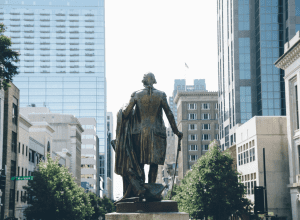Election 2024: North Carolina governor’s race among ‘most expensive’
Writer: Eleana Teran
 July 2024 — North Carolina, a newer addition to the lineup of swing states, has become a pivotal battleground with a history of close races and shifting political dynamics. The upcoming elections are critical, featuring a highly contested gubernatorial race, State Senate race, the presidential election, and elections for the U.S. House of Representatives, as well as state-level offices that could fundamentally reshape the state’s political and social landscape. Once a reliably Republican state, North Carolina’s political terrain has evolved, with recent elections reflecting narrower margins and increased competition between the two major parties.
July 2024 — North Carolina, a newer addition to the lineup of swing states, has become a pivotal battleground with a history of close races and shifting political dynamics. The upcoming elections are critical, featuring a highly contested gubernatorial race, State Senate race, the presidential election, and elections for the U.S. House of Representatives, as well as state-level offices that could fundamentally reshape the state’s political and social landscape. Once a reliably Republican state, North Carolina’s political terrain has evolved, with recent elections reflecting narrower margins and increased competition between the two major parties.
In North Carolina’s partially closed primary system, registered voters can only participate in their respective party’s primaries. Unaffiliated voters, however, can choose which primary to participate in each election cycle, allowing them to vote in the Democratic primary one year, and the Republican primary the next, offering greater flexibility and engagement for voters.
North Carolina is among the 10 most populous states in the country, and has a voter base totaling approximately 7.6 million, according to the NC State Board of Elections. About 65% of voters are white, nearly 20% are Black, and 4% are Hispanic. Other racial groups, including American Indian/Alaska Native, Asian, Native Hawaiian/Pacific Islander, and multiracial, together make up around 6%. Additionally, 9% of voters are categorized as undesignated, contributing to the diverse yet predominantly white makeup of North Carolina’s voters.
Statewide, the gubernatorial race will replace term-limited Democratic Governor Roy Cooper. This is set to be one of the most expensive, most watched, and most competitive races in the country. The 2024 match-up includes current Democratic Attorney General Josh Stein and current Lieutenant Governor Mark Robinson.
Stein’s key priorities include improving education, making the economy work for everyone, and increasing access to healthcare. He emphasizes public education funding, workforce development, and housing affordability. Robinson’s platform focuses on growing the economy, cutting taxes, and increasing public safety. He advocates for regulatory reform, teacher pay raises, and support for law enforcement and veterans.
The state’s Senate elections are also drawing considerable attention as both parties vie for control of this legislative body. The Republican Party, currently holding a slim majority, aims to maintain its power while Democrats see an opportunity to flip the chamber.
Key Republican figures, such as State Senate President pro tempore Phil Berger, and Majority Leader of the North Carolina Senate Paul Newton, are up for re-election. Berger has been a prominent advocate for conservative policies, including tax cuts, regulatory reform, and opposition to Medicaid expansion. Newton, known for his focus on economic policy and energy issues, has also been influential in advancing the party’s legislative agenda.
On the Democratic side, Minority Leader of the North Carolina Senate Dan Blue is leading the charge to gain seats. Blue, known for his progressive stance, is focusing his campaign on improving public education, promoting economic growth, and building healthier communities. Other notable democratic candidates include State Senators Natalie Murdock and Michael Garrett, who are both emphasizing social justice, healthcare, housing and environmental sustainability in their platforms.
In addition to these prominent races, local elections are also heating up. In Wake County, key positions like Wake County Board of Commissioners and the City of Raleigh Mayor are up for grabs, with focus areas including housing, transportation, and economic development. The candidates for Raleigh Mayor include Democrat Janet Cowell, former North Carolina State Treasurer; Republican Paul Fitts, mortgage broker and 2017 mayoral candidate; community advocate Eugene Myrick; nonprofit executive and 2022 mayoral candidate Terrance Ruth; civil rights activist Delmonte Crawford; and pre-law student James Shaughnessy IV.
Cowell, running for office after her tenure as State Treasurer, aims to bring her financial expertise to address Raleigh’s budget and growth challenges. Her key positions include sustainable development, expanding public transportation and access to housing, and environmental protection and resilience.
Fitts, the Republican candidate, emphasizes reducing taxes and improving business conditions in Raleigh. His platform covers public safety, making the city more business friendly, investing in infrastructure projects to reduce traffic congestion and affordable housing.
Myrick, a community advocate & former educator, focuses on environmental justice, sustainable development, and public services. He supports comprehensive planning to address traffic, making public transit free, enhancing social services, supporting small businesses, and promoting equitable neighborhood development.
Ruth, a nonprofit executive and former mayoral candidate, is running again to address equitable housing, effective transportation, and economic security. He aims to increase affordable housing options, provide reliable transit solutions, and support sustainable economic growth.
Crawford, a civil rights activist, focuses on reparations, an anti-Black crime bill, and improving housing affordability. He advocates for sustainable transit, support for working families, Freedman Affairs Commissions, and Black history in education. Crawford also supports robust border security and has a zero-tolerance stance on dangerous drugs.
Shaughnessy IV, prioritizes affordable housing, mental health resources, and improved infrastructure. He aims to enhance the GoRaleigh transit system, support local farms for school meals, and introduce a housing credit for city workers.
Housing and transportation remain the critical issues for all candidates. According to a recent study, Raleigh needs over 17,000 additional affordable housing units to meet current demand, highlighting a key issue for many residents. As the population continues to increase, addressing the growing demand for better transit solutions is essential for the city’s future.
At the top of the ballot, North Carolina remains a critical swing state in the presidential election. Although no Democrat has won North Carolina’s electoral votes since 2008, current polling indicates a near toss-up between Donald Trump and Joe Biden. The latest Meredith Poll shows Trump with 41%, Biden with 39%, and Robert F. Kennedy Jr. with 9%, underscoring the state’s competitive nature. However, Biden announced that he will no longer be seeking reelection in a statement released on X Sunday morning. Later that day, Vice President Kamala Harris said, “I am honored to have the President’s endorsement and my intention is to earn and win this nomination,” in a post on X.
Recently, the State Board of Elections approved the We the People party, supporting Robert F. Kennedy Jr., by a 4-1 vote, while the Justice for All Party, backing Cornel West, was denied by a narrow 3-2 vote. This affects their ability to run candidates statewide. Despite meeting signature requirements, the Justice for All Party’s status won’t be reconsidered. Republican board member Stacy Eggers criticized the decision, emphasizing the validity of the verified signatures.
For more detailed coverage and analysis, visit:
https://capitalanalyticsassociates.com/
Update [Monday, July 22nd 8:34 a.m. EST]: This article has been updated to reflect President Joe Biden is no longer seeking reelection and Vice President Kamala Harris is vying for the Democratic presidential nomination.













